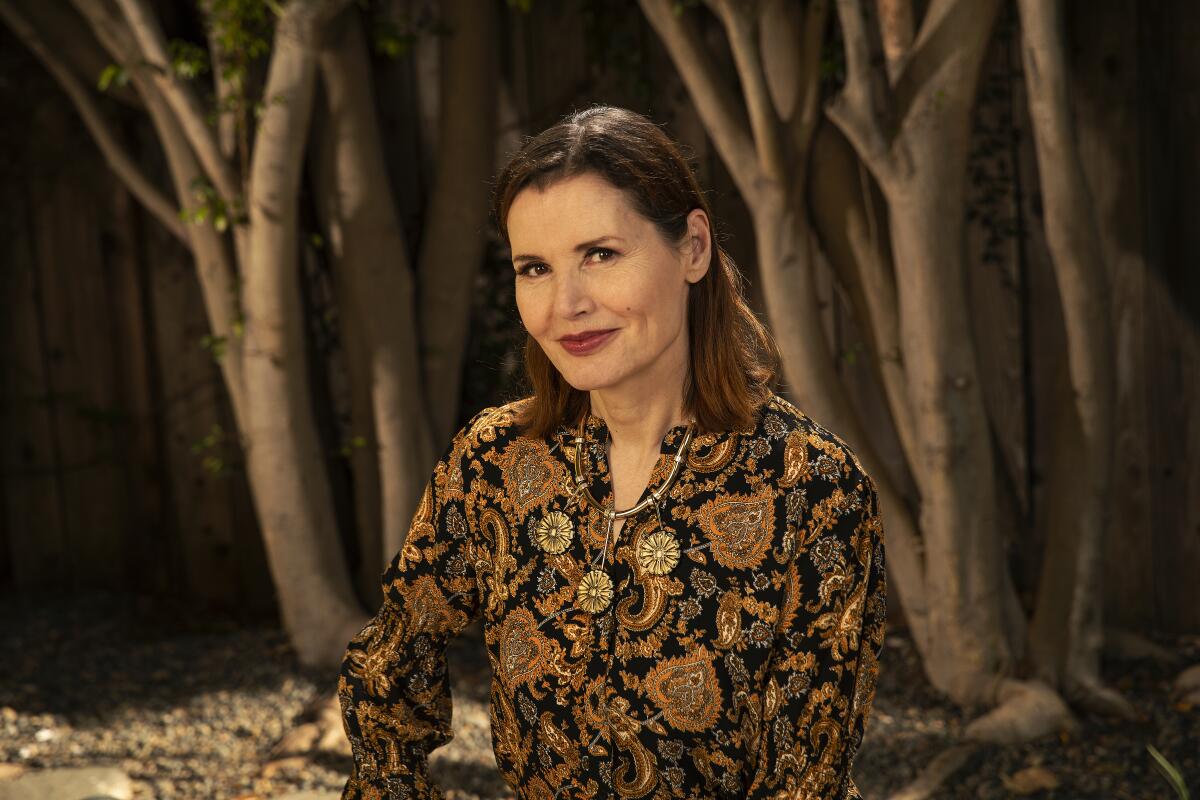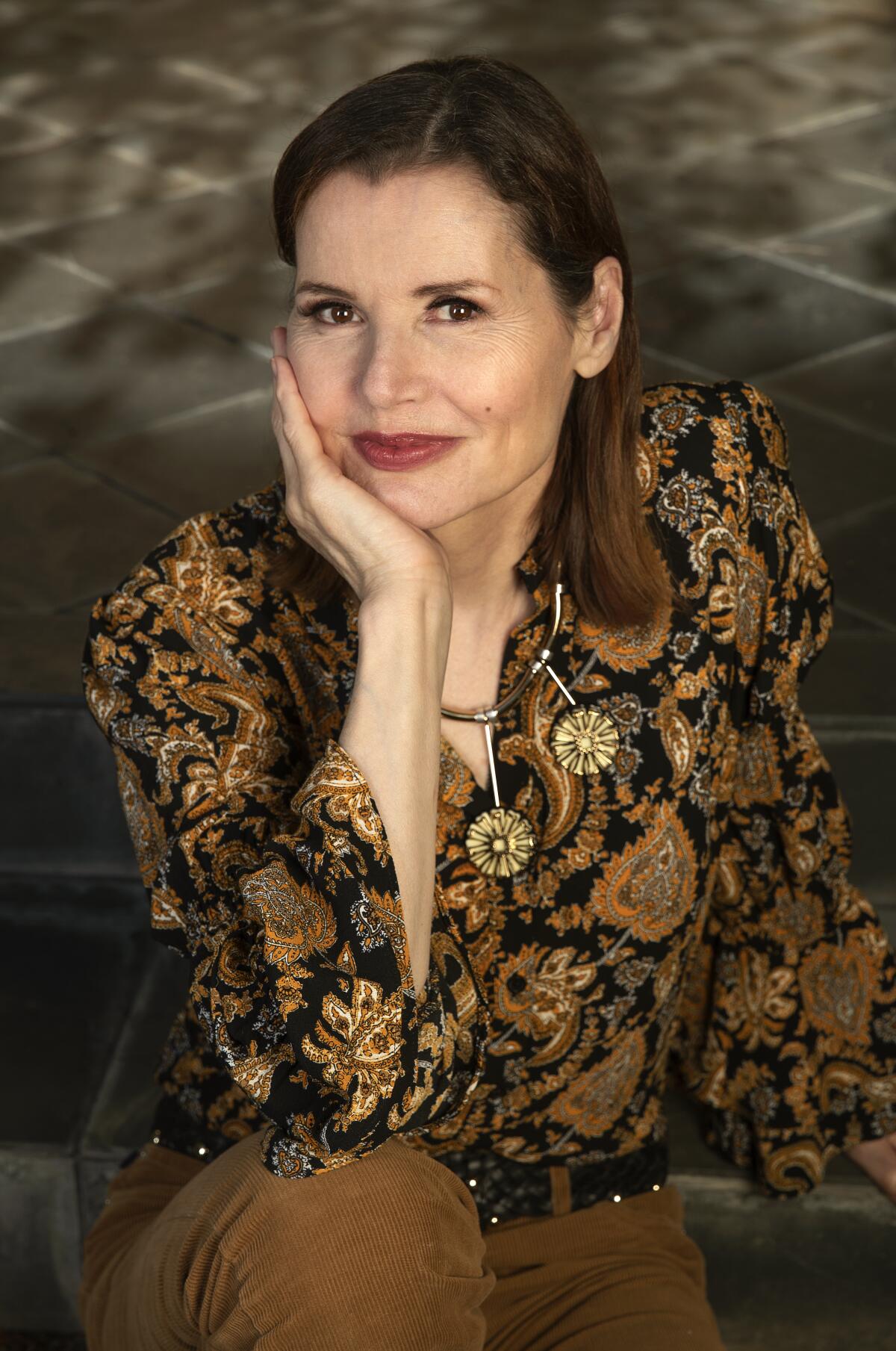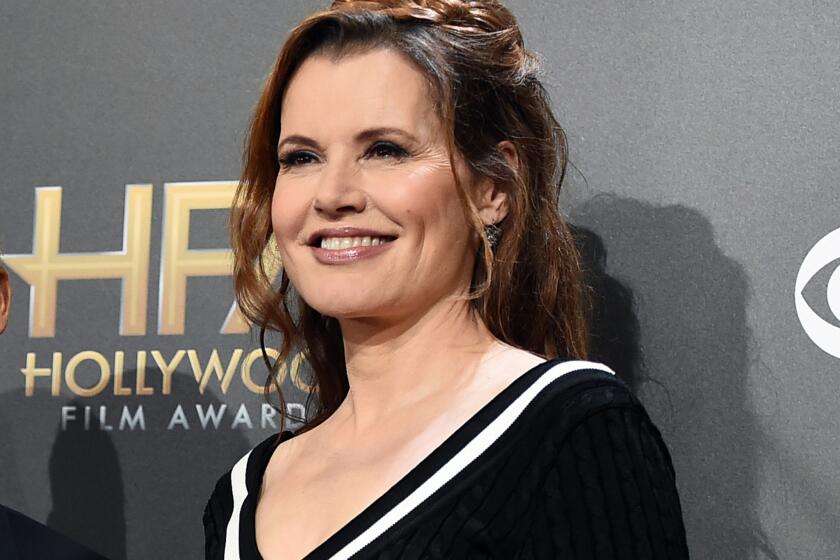As her film fest goes virtual, Geena Davis fights on for Hollywood diversity and inclusion

When Geena Davis isn’t acting, her side projects in the pursuit of diversity and inclusion keep the Oscar winner busy. Through the Geena Davis Institute on Gender in Media, the nonprofit research and advocacy group she formed in 2004, she brings stats about representation to studio boardrooms year after year. Complementing that work is the Bentonville Film Festival, held annually in Bentonville, Ark., which she cofounded, and which has persevered to open its sixth iteration on Aug. 10 in a largely virtual edition due to the pandemic.
Luckily, Davis has always been an optimist. As the festival’s mission to foster inclusivity across media continues to expand, she’s hopeful that going online this year will bring new audiences in to see what they’ve been doing in Bentonville, pop. 54,909. “We realized that this is an exciting opportunity to see how it will go over because now anybody in the world can watch these movies,” Davis said over Zoom from her home in Southern California.
The first Bentonville Film Festival is a little festival with big aspirations and deep pockets.
Backed by founding sponsor Walmart, the festival launched in 2015 with a strong emphasis on female-directed films. Each year it has taken bigger steps to be more inclusive of underrepresented voices. This year’s feature lineup is directed by 65% BIPOC and 40% LGBTQIA+ identifying filmmakers, according to festival organizers. “We’re learning and changing and growing, and now here we are with the most radically inclusive program that I’ve done over the last six years,” said Wendy Guerrero, president of programming.
Among this year’s 68 films, more than 80% of features are directed by women, including opening-night selection “(In)visible Portraits” by Oge Egbuonu, examining the marginalization of Black women in America; Philippa Lowthorpe’s 1970-set “Misbehavior,” starring Gugu Mbatha-Raw as Jennifer Hosten, the first Black winner of the Miss World competition; documentary “Parkland Rising,” from Cheryl Horner McDonough, about the student activists of Parkland, Fla.; and Elegance Bratton’s documentary “Pier Kids,” which follows three queer and trans youth of color battling homophobia and homelessness in New York City.
Filmmakers returning to the festival include actresses Sujata Day (“Insecure”), who makes her feature directorial debut with “Definition Please,” loosely based on her own experience growing up Indian American in Pennsylvania, and Janina Gavankar (“The Morning Show”), who makes her foray into directing, co-helming the short film “Stucco.”
Panel discussions and special events will include conversations about advancing Latinx and disability representation as well as a “best of” version of the popular “Geena and Friends” series, in which Davis and celebrity guests reimagine male-centric movies.
Ahead of the festival, Davis discussed how her work onscreen, through the festival and in her activism has dovetailed into a multifront effort to effect long-overdue change in Hollywood.
The tagline for the Bentonville Film Festival is, “If they can see it, they can be it.” You’re now entering your sixth year. Take us back to the reason why you started this film festival in the first place.
I had my Institute on Gender and Media for a number of years and became heavily involved in how women are represented in media, particularly in children’s media. This opportunity came up as the festival was being put together and I was asked to come onboard and be the cofounder and the chair, and I jumped at the chance. I thought it was a fantastic opportunity to expand what I had been doing.
While you’re the face of the Bentonville Film Festival, your advocacy work through the institute is largely not public-facing. What does that work look like? Who are you presenting the studies that the group does, and the findings of your research, to?
It’s almost all not public-facing, and it was designed that way from the beginning. When my daughter was a toddler, I realized it was such a problem with gender nonparity in what kids were seeing. It was so eye-opening! It made me really realize, “What are we doing?” We are all trying to address this problem of gender equality and yet from minute one we’re training kids that boys are more important than girls.
I became obsessed with that, and I couldn’t find anybody else in the industry who saw what I was seeing. I spent two years having the largest study ever done on gender depictions in movies and TV for kids, and the whole point was so I could go directly to the creators. I know everybody. I can go directly to them, and I have this research. So I called a studio once I had it and said, “Can I come share some data with you?”
What was that first meeting like?
It was a room of 40 people or so and we presented the data, and their faces fell. They were thinking about the stuff they’d made, and one animation director said, “I just drew a scene in a restaurant today and every person that I drew, customers and waiters, were men. I don’t know why I did it.” He made a joke: “I’m the problem!” The casting director for the studio said, “Every script that we get, my staff and I go through this and we try to figure out, who can become Asian? Who can become Hispanic? Who can become Black? And we never once have said, who can become female? And I don’t know why.” That’s been the reaction from the first meeting to one we did last week. We go to every studio, every network, every guild, every production company.
The great thing has been that they’ve always said, “Please come back.” Sometimes they ask us specifically to look at this factor or that factor. So it’s happening. The change is happening, and without anybody really needing to know that I’m doing that.
What changes are you seeing?
Last fall we did a new study of children’s TV and we found that for the first time ever, we have reached parity among lead characters, female and male. And earlier this year we discovered that in G, PG and PG-13 movies we’ve reached parity in the lead characters also, male and female. We still have work to do with people of color, although it’s getting much closer — it’s like 32% and they’re 38% of the population — so it’s getting closer. But when you look at supporting characters, that’s still bad. And there’s a long way to go for LGBTQ, people with a disability, people of size. But it’s encouraging.
Numbers are just one part of it, right? How important is it to also qualitatively assess what we’re seeing onscreen?
That’s the other half. The first thing that stuck out to me was, where are they? We’re half the population and we’re showing kids worlds that are nearly bereft of female presence. But then, of course, it’s the quality of the character too — what are they doing? I remember seeing a cartoon show with my boys about trucks that could talk. Maybe they were monster trucks? There was one female one and it was pink with a car-sized bow on top and I’m like, really?

In the spirit of “If they can see it, they can be it,” you knew you wanted to be an actor from a very young age. Who did you see then that showed you what you could be?
I wish my folks were still around so I could grill them about it more, but evidently I announced to them when I was 3 that I was going to be in movies. It’s the only thing I remember ever wanting to be but I can’t imagine what I saw. How did I even know that was a job? When I was older, my best friend and I played every day after school and we would pretend to be characters from “The Rifleman.” I would be the father, because I was taller, and she would be my son Mark, and we would just act out stories from that TV show. It never occurred to us that it was strange or interesting that there weren’t female characters we wanted to pretend to be; we just naturally gravitated toward the much more exciting male characters.
“Thelma & Louise” and “A League of Their Own” are influential films of yours whose female characters were empowered and, in turn, empowered generations of fans. What was the moment you realized your work could have this kind of impact?
It’s interesting. People liked “Beetlejuice” and “The Fly,” movies like that, so I got used to people recognizing me. After I made “Thelma & Louise,” all of a sudden if people recognized me from that movie, it was completely different. They wanted to talk about it — “This is how many times I saw it!” “This is how it impacted my life!” It made me realize how few opportunities we give women to come out of a movie feeling empowered and inspired. I [started] thinking about that with everything I’m going to do, or not: What are the women in the audience going to think about my character?
Not meaning that I want to play role models — I hate that term, anyway, because a lot of people say, “We want strong female characters,” and a lot of the time “strong female characters” are utterly boring. They have no personality but they’re “tough.” What we want is complex female characters. I was looking for characters that were in charge of their own fate. That’s what I realized about “Thelma & Louise” that was so meaningful to women. We retain our control of our destiny, to the bitter end.
Which is one aim of the Bentonville Film Fest, to create change. This year’s feature lineup boasts more than 80% film directed by women, 65% filmmakers of color and 40% LGBTQIA+ identifying filmmakers. How does that reflect the original goals of the festival and how they’ve evolved since?
Our criteria have remained the same: not just to compete but to be shown. A goal of mine from the beginning was, I want this to become such a cool festival that people go, “I bet if I have a female director we could get in Bentonville.” So I feel like it’s happening because there are so many more movies that are great that we want to show and that are directed by such a diverse group of people.
This year the festival will take place largely virtually due to COVID-19. Do you see this as a chance to expand the audience?
Most of it will be virtual but in Bentonville itself there will be some drive-in activations. We realized that this is an exciting opportunity to see how it will go over because now anybody in the world can watch these movies. Before, you had to come to Bentonville. And we have such fabulous movies it will be interesting to see how that plays out. Maybe we’ll decide that we always want to do that as well as have the live part, so people everywhere can enjoy it.
One of the films in last year’s festival was a documentary you executive produced, “This Changes Everything,” about the systemic issues women in Hollywood face and have faced. Why was that an important project for you to make?
When “Thelma & Louise” came out so many people loved it, but there were also people who thought, “This is a horrible thing, because now women have guns … they drive off cliffs, they shoot men, it’s terrible!” But they were unified in saying, “This is going to change everything. Now there’s going to be so many movies with women.” My very next movie was “A League of Their Own,” and the same thing — “Now there’s going to be so many female sports movies.” Five years later another movie starring women comes out and it’s, “Oh, this is going to change everything.” Fifteen years go by. Twenty years go by. And it’s still one-offs, never any momentum. So that’s why we called the movie that. It’s like, what’s it going to take?
At one point the interesting work for many female performers in Hollywood seemed to move from movies to television. Do you feel like the interesting work has also, then, moved offscreen?
Oh, yes. So many actors in the industry have so many other passions they try to support. But my true passion is acting. I just want to be in some great movies. And I want to be sure that people know that I’m not doing this exclusively now, because when I go and meet with the studios and talk about all this, I say, “Now it’s time for questions — although I have a question for you: When is my next Warner Bros. movie?” And they go, “Ha ha ha” and I’m like, “I’m serious. I didn’t retire, so think of me when you’re adding female parts like I’m here telling you to do.” [Laughs] I don’t think I’ve gotten any jobs directly from this except Huntara on “She-Ra and the Princesses of Power.” That, I got directly from saying, “I want to be on one of your animated shows.”
So it is an effective way to get into more rooms. All you have to do is create an institute for inclusion research and advocacy and present your findings to every executive in town.
I’m trying!
More to Read
Only good movies
Get the Indie Focus newsletter, Mark Olsen's weekly guide to the world of cinema.
You may occasionally receive promotional content from the Los Angeles Times.












